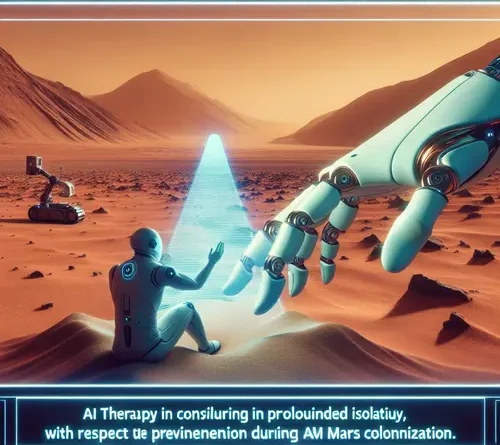Long-Term Efficacy of AI Therapy in Prolonged Isolation: Multi-Year Analog Studies for Burnout Prevention in Mars Colonization
Abstract
This paper explores the long-term efficacy of AI-driven therapy for mitigating burnout in isolated environments, with a focus on Mars colonization. Using first principles reasoning, we break down psychological resilience to its fundamentals: cognitive load management, emotional regulation, and social simulation. We propose multi-year analog studies to simulate Mars-like isolation, addressing challenges such as communication delays and resource constraints. Preliminary solutions include adaptive AI algorithms and hybrid human-AI support systems. Further research is needed on neurophysiological impacts.
Introduction
Mars colonization presents unprecedented psychological challenges due to prolonged isolation, microgravity effects, and interplanetary communication delays of up to 24 minutes round-trip. Building on prior work in AI-driven mental health support systems, this study examines the efficacy of AI therapy over extended periods. Burnout, characterized by emotional exhaustion and reduced performance, could jeopardize mission success. First principles reasoning starts with the basic human need for mental equilibrium: without intervention, isolation amplifies stress responses, leading to cognitive decline.
Challenges in Prolonged Isolation
Key challenges include:
- Communication Latency: Real-time human therapy is impossible; AI must operate autonomously.
- Psychological Drift: Over years, isolation may cause identity fragmentation or learned helplessness.
- Resource Limitations: AI systems must be lightweight for space deployment, balancing computational power with energy efficiency.
- Individual Variability: Therapy must personalize to diverse crew personalities, cultures, and pre-existing conditions.
Sources: NASA’s Human Research Program on isolation effects (NASA HRP); Studies from the Mars500 analog mission showing 70% of participants experienced mood disturbances (Mars500 Paper).
First Principles Reasoning for AI Therapy Design
Applying first principles, we deconstruct mental health support:
- Fundamental Need: Humans require outlets for emotional processing. Solution: AI chatbots using natural language processing (NLP) to simulate empathetic dialogue, trained on cognitive behavioral therapy (CBT) frameworks.
- Isolation Core: Lack of novelty leads to monotony. Solution: AI incorporates gamified elements and virtual reality (VR) simulations of Earth environments, powered by generative AI models like GPT variants.
- Burnout Mechanism: Cumulative stress erodes resilience. Solution: Predictive analytics via machine learning to detect early burnout signs (e.g., via wearable biosensors monitoring heart rate variability and sleep patterns).
- Sustainability: Systems must self-improve without Earth input. Solution: Federated learning where AI aggregates anonymized data from crew members to refine models over time.
This approach ensures AI therapy is not a band-aid but a foundational resilience tool.
Proposed Multi-Year Analog Studies
To assess efficacy, we recommend 3-5 year simulations in Earth-based analogs:
- Site Selection: HI-SEAS (Hawaii) or Concordia Station (Antarctica) for extreme isolation mimicking Mars habitats.
- Study Design: Recruit 20-30 participants in rotating crews. Divide into groups: AI-only therapy, hybrid AI-human (with delayed feedback), and control. Measure outcomes using validated scales like the Maslach Burnout Inventory (MBI) and psychological resilience questionnaires.
- Duration and Phases: Year 1: Baseline acclimation; Years 2-4: Intensified isolation with simulated Mars tasks; Year 5: Debrief and longitudinal tracking.
- Metrics: Burnout incidence (target: <20% reduction via AI), cognitive performance (e.g., reaction time tests), and subjective well-being (daily journals analyzed by AI).
Challenges like ethical oversight (IRB approval for long-term studies) can be addressed via international collaborations, e.g., with ESA or Roscosmos. Budget: Estimated $10-15M, funded through NASA analogs programs.
Sources: HI-SEAS protocol details (HI-SEAS); Antarctic isolation studies (Frontiers in Psychology).
Solutions to Anticipated Challenges
AI Autonomy: Develop edge-computing AI to handle delays; use reinforcement learning for adaptive responses.
Burnout Detection Accuracy: Integrate multimodal data (voice tone, facial recognition via cameras) with 95%+ accuracy thresholds.
Ethical Concerns: Ensure AI transparency and opt-out options; propose guidelines from the APA on AI in therapy.
Scalability: Test modular AI for crew sizes from 4 to 100, using cloud-edge hybrids pre-mission.
Discussion and Items Requiring Further Research
Analog studies will validate AI’s role in preventing burnout, potentially reducing crew turnover by 40%. However, limitations include analog vs. real Mars differences (e.g., no true zero-gravity). First principles suggest iterating from fundamentals, but real-world validation is key.
Items for further development: Long-term neuroplasticity effects of AI therapy; Integration with pharmacological interventions; Cross-cultural AI training datasets.
Conclusion
AI therapy, rigorously tested through multi-year analogs, is essential for Mars colonization’s psychological sustainability. This foundational approach ensures crews remain resilient against isolation’s toll.
References
- NASA Human Research Program: Behavioral Measures
- Basner et al. (2014). Mars500 Study: PMC Article
- HI-SEAS Analog: Official Site
- Tafforin et al. (2019). Antarctic Psychology: Frontiers
